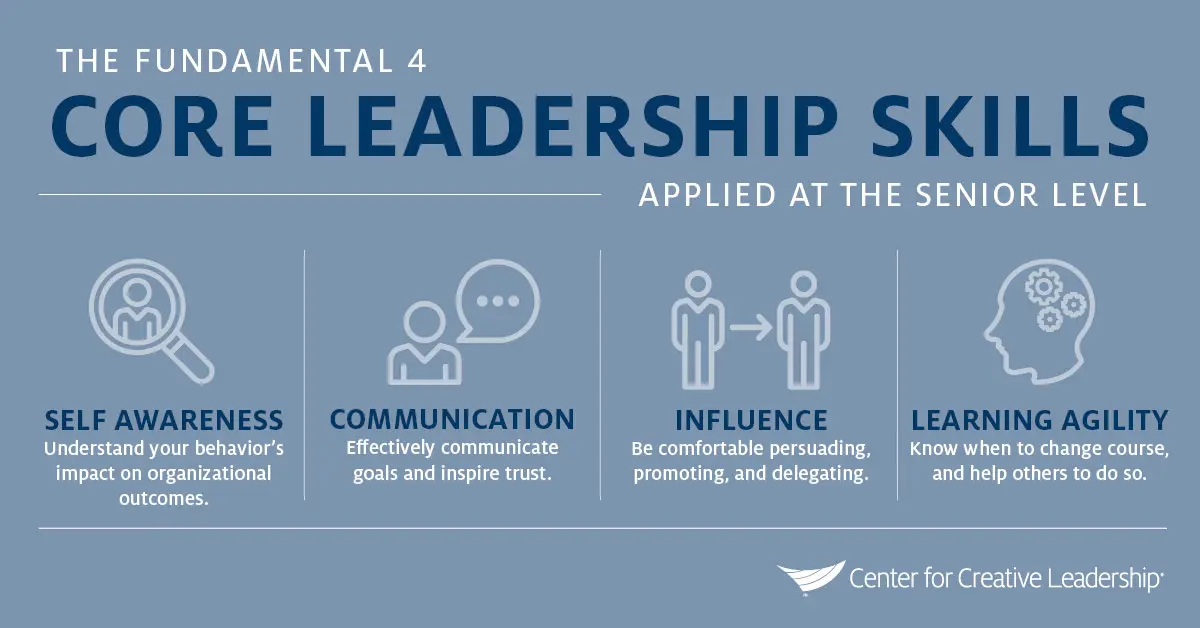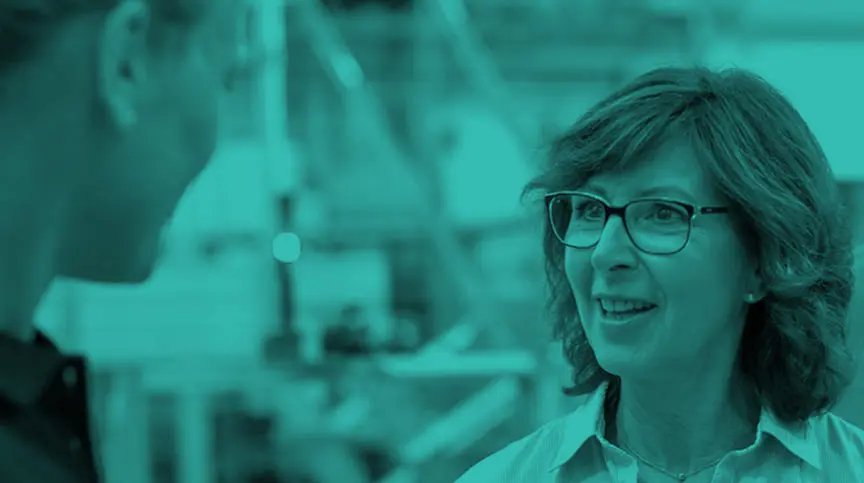Common Challenges Faced by Senior Executives & the Leadership Skills Senior Leaders Need
All new roles come with new responsibilities. But experienced leaders in senior level roles face unique challenges that are directly tied to the bigger scope of work.
Whether taking on a top job at a small firm, managing a function of a mid-size business, or running a division of a global company, senior-level executives must lead in ways that build on their experience, but also go beyond it.
Typically, an experienced leader comes into the role having been very successful in leading a specific area or team. When they’re promoted or the business changes significantly, senior executives need to pivot skillfully to run a much broader, bigger function where the demands are significantly different from before.
Before we discuss which senior leadership skills are most important for success, though, first let’s clarify who we mean when we say “senior leaders.”
In our decades of experience, we’ve worked closely with leaders around the world who are running business departments or divisions in large global organizations. They often carry titles such as vice president or senior director and have responsibilities for one or more functions — such as Sales, Marketing, Finance, Operations, Engineering, IT, Legal, or Human Resources. They run business units and geographic regions. These senior functional leaders typically manage groups of more than 500 people, have budgets in excess of $500M, and are often on a shortlist to become COO or CEO.
The Cost of Lacking Senior Leadership Skills
These highly experienced leaders face unique challenges when leading from the top, most notably setting a vision and building toward the future. At the same time, they face real and challenging short-term pressures.
So the costs of any lacking in their senior leadership skills can be high, and organizations suffer greatly when their senior leaders falter or fail. The effectiveness (or ineffectiveness) of executives as leaders is directly tied to the overall inclusiveness of the organizational culture, the levels of psychological safety at work, and the success of key business outcomes such as driving innovation, setting strategy, building senior leadership alignment, and improving customer and employee engagement.
In spite of this risk, development at this leader level is often overlooked (and for many senior executives, their calendars are simply too full to fit in a lot of time for personal goal-setting and self-reflection). But setting aside time for continued growth at this leader level can be transformational — for both the individual and the organization.
With the right training and practice, an experienced executive can develop the senior leadership skills needed to avoid common pitfalls and meet their organization’s seemingly divergent needs, helping to secure the future of the business.
The Senior Leadership Skills Most Needed by Executives
First, at CCL, we believe that success at every leader level is rooted in the “Fundamental 4” leadership skills of self-awareness, communication, influence, and learning agility. Experienced leaders have typically developed these skills during their careers. But as they advance up the ladder, they must understand how these 4 key leadership skills are applied differently at the senior level.
“The Fundamental 4” Leadership Skills, Applied at a Senior Level
1. Self-Awareness.
Self-awareness is a critical skill needed by all leaders in an organization, and it’s no different for experienced leaders. It goes beyond knowing their own strengths and weaknesses, preferences and patterns, and the effect of their behavior on others. At the top levels, senior leaders really need to understand the impact that their leadership behaviors have on organizational outcomes.
Unfortunately, the higher up the management ladder leaders go, the less feedback they get. In addition, senior leaders may be overusing strengths that were more critical in previous roles, which is often a challenge for an experienced leader. Help them look for ways to further increase self-awareness. Have your senior executives found continued ways to get frequent, unbiased feedback to help them keep growing their level of self-awareness?
2. Communication.
Being an effective communicator is key for all leaders, and it becomes an even more important leadership skill for senior executives as heads of functions, business units, and divisions. The complex logistics of sharing information — often across time zones, cultures, and operations — and leading employees from a distance is one challenge. Effectively communicating the goals of the business while at the same time inspiring trust is another.
Encouraging open communication and discussion among managers and employees is also part of a senior leader’s role. Building a climate of candor and respect for differences is critical to ensure that individuals and teams feel supported, motivated, and fully engaged in the success of the business. Do your senior leaders have the ability to express ideas clearly through what they they say and write? Are they able to manage remote teams well and share important information, give feedback, and address concerns? How well do they communicate the vision and articulate complex ideas?
3. Influence.
The process of influencing others takes on new dimensions for experienced leaders as well. Senior executives need to be able to influence others effectively, to persuade, promote, and explain, remaining comfortable with and understanding the role of power. Influencing also involves setting up and engaging an extensive network of peers and contacts, as senior leaders must interact with a wide variety of organizational stakeholders.
To be effective at this level, an experienced leader must also be able to delegate effectively. They can’t directly drive the tasks any longer, but instead, they have to get results done through the actions of others. Are your senior leaders able to inspire and motivate others to take action? Do they delegate well? How strong, open, and diverse are their networks?
4. Learning Agility.
For an experienced leader, applying previous knowledge in new ways is also crucial to success. Understanding the limits of their own experience and point of view becomes even more important as the scope of their role increases.
For many seasoned executives, this has become second nature. But over-relying on what worked in the past or assuming they have what it takes to be successful in the future can spell trouble. For senior executives, the challenges may be knowing when to change course, having the tools to learn and adapt, and helping others to do the same. Being an agile learner is still an important leadership skill, even at the senior level. Do your experienced leaders take time to reflect on and learn from experience? Do they continue to seek opportunities to learn? Do they stay open to others’ perspectives, ideas, and insights?
Key Senior Leadership Skills That Executives Need to Succeed
Beyond the Fundamental 4 leadership skills, senior executives need other skills as well to succeed at top levels. Senior leaders are, of course, experienced in setting strategy, prioritizing, and managing others. But leading a large function or operation demands something more — it requires that they are able to drive organizational-level results. Managing a department, business unit, large function, or division means they also need to develop additional senior leadership skills, too.
5. Strategic Thinking, Acting, and Influencing.
Leaders need the perspective and ability to balance the tension between short- and longer-term strategic actions, between daily tasks and tactical concerns, along with strategic possibilities and actions that impact the long-term viability of the organization. What are your senior leaders doing to step back, think about the vision, and clarify strategy? What new skills (their own or others’) should they be developing, or what relationships should they build? Learn more about becoming a strategic leader.
6. Working Across Organizational Boundaries.
At this leader level, challenges simply can’t be solved within any one function alone, so senior executives must leverage leadership to impact organizational outcomes across boundaries. Senior leaders must be able to understand and manage organizational politics, form alliances, and build collaborative relationships. Collaborating across boundaries means spanning vertical, horizontal, demographic, cultural, and geographic differences and is a key part of a senior leader’s role — and again, their actions can and will have an impact across the whole organization. Are your senior leaders ready and able to operate across the entire system?
Other Key Leadership Skills Senior Executives Need
In addition to the 4 core leadership skills, plus the abilities to work across boundaries and think and act strategically, our research has identified 5 additional senior leadership capabilities needed to succeed, given the breadth and complexity of the challenges of experienced leaders at this level:
- Being visionary
- Driving results
- Creating engagement
- Identifying innovation opportunities
- Leading globally
While this checklist just touches on the complexity of the job of senior leaders, these competencies are also key to meeting the goals of the organization.
Preparing Senior Leaders to Tackle Complex Challenges
One of the best ways for senior leaders to make the transition successfully from leading a team to leading at the functional level is to gain a deep understanding of their strengths and development opportunities as an experienced leader. It’s critical to understand how leadership behavior impacts organizational outcomes.
Especially during a time when uncertainty is heightened and innovation is critical for organizations to survive and thrive, how well do your senior leaders perform in these critically important areas? How do functional leaders face challenges and focus on their development?
To make development as relevant as possible to their real work and goals, consider the context. Participants in our Leading for Organizational Impact program exclusively for senior leaders reflect on real organizational challenges they face that involve one or more of the following senior leadership skills noted above:
- Working across organizational boundaries: The challenge can’t be solved within any one function alone. Leverage leadership to impact organizational outcomes.
- Strategic thinking and acting: Balance the tension between short- and longer-term strategic actions, tactical concerns, and strategic possibilities.
- Innovating and creating engagement: The challenge requires change, not just in operational systems and structures, but more deeply in human systems, culture, beliefs, and values.
They then return to work with clear action plans for addressing these real-world challenges they face. By strengthening their senior leadership skills, and thinking through how these skills help them tackle their leadership challenges, even highly experienced leaders can continue to accelerate their effectiveness. They begin to see their strengths and weaknesses within the context of the entire business and the demands of the role. And they can then work on the specific behaviors that will have the greatest impact on their own success, that of their department or function, and the entire organization.
Ready to Take the Next Step?
Help executives build the senior leadership skills needed to succeed at the highest levels of your organization. Explore our executive leadership programs, including the in-person Leading for Organizational Impact program for senior leaders.









